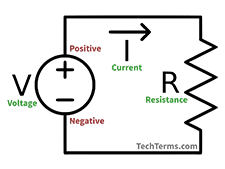Circuit
In electronics, a circuit is a closed path that allows electricity to flow from one point to another. It may include various electrical components, such as transistors, resistors, and capacitors, but the flow is unimpeded by a gap or break in the circuit.
A flashlight is an example of a basic circuit. When the switch is off, the circuit is not closed, meaning electrical current will not flow from the batteries to the flashlight's bulb. When you move the switch to the on position, a piece of metal in the flashlight physically closes the gap in the circuit. Electricity from the batteries then flows to the bulb making it light up.
In computing, the term "circuit" is used more liberally and may be used to reference a circuit board or an integrated circuit. The internal workings of computers and other electronic devices are comprised of these components, which may each contain hundreds or thousands of individual circuits.
The large number of circuits inside computers allow them to route data to different locations and perform complex calculations. For example, a chip may route graphics operations to the GPU and other operations to the CPU. These processors contain logic gates that can rapidly open and close circuits. Modern processors have so many circuits and transistors, they can perform billions of instructions every second.
 Test Your Knowledge
Test Your Knowledge